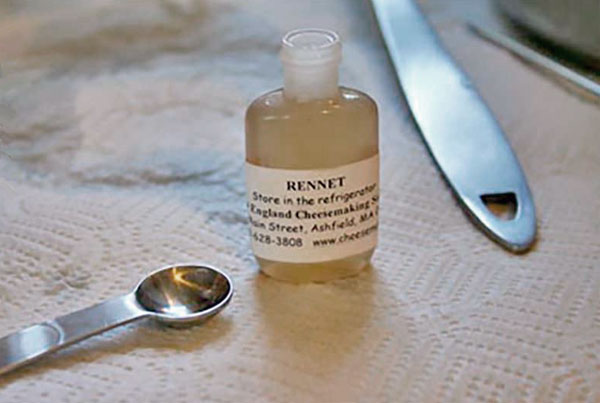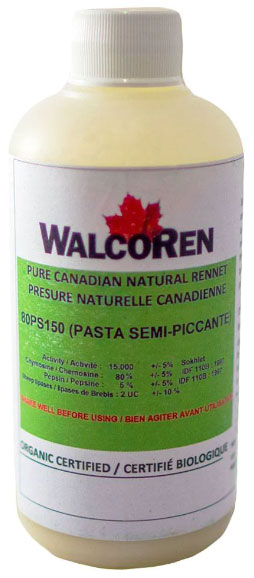Submitted by Kate Johnson and Kelly Liebrock of The Art of Cheese in Longmont, CO
February 21, 2023
Rennet is an important ingredient in cheesemaking and is the main coagulant used for most cheeses. If you’re curious about exactly what rennet is and how it works, you can get much of that info in our article “What is Rennet and Why Do You Need It?.”
But, if you’ve been shopping around for rennet recently, you might have noticed that it comes in all kinds of varieties. In fact, our good friends at cheesemaking.com list 12 different types of rennet for purchase!
We’ve summarized the details about most of these options below to give you one place to look for the main characteristics of each. Still not sure which one to choose? While there is no one right answer, asking yourself a few questions might help you narrow the list a bit and make a choice that’s best for you.
Here are some things to ponder as you make your selection:
1. Do you make cheese frequently or only on rare occasions?
For only occasional cheesemaking, you might choose a tablet form of rennet because it lasts much longer than liquid (up to 5 years when stored in the freezer vs 6-8 months for the liquid types when stored in the refrigerator).
2. Do you tend to make small batches of cheese or bigger batches?
The liquid versions of rennet are much easier to measure in smaller quantities than the tablets, and powders are so concentrated they’re best for really big batches, so for those making 1-2 gallon batches (or smaller), liquid rennet will likely be a better choice.
3. Do you make a lot of soft rennet-assisted or lactic set cheeses or more often fully-renneted and hard cheeses.
For recipes that call for only a drop or two per gallon, liquid rennet is definitely easier to work with whereas bigger batches of fully-renneted recipes (those that require ¼ to ½ tsp per gallon) may be just as easy to make with tablets or powdered rennet.
4. Are you vegetarian or do you have an ethical reason not to want to use veal, kid, or lamb rennet?
If so, you can eliminate the animal rennet options in all their forms. Of course, there are still a lot of vegetarian options to choose from, including ones that are derived from a variety of fungi to those derived from plants. It may just take some experimenting to see if one works better or tastes better to you.
5. Do you want to follow our recipes for your cheesemaking (or most other standard cheesemaking book recipes)?
Our rennet amounts are based on single strength animal rennet (as are those of most common recipes). Not that it’s too hard to cut the amount in half if you’re substituting a double-strength rennet for single-strength, but it is something you have to remember. If you forget to do that, it’s likely your cheese will turn out tough and chewy and possibly a bit bitter.
Some people like the “authenticity” of working with animal rennet as that’s how cheese has been made for centuries by many rustic cheesemakers. In fact, in some cultures a dried piece of animal stomach is simply added to milk to this day to create the magical transformation from liquid milk to the beginning stage of solid cheese. But what’s best for you is really all that matters.
I have been told by people with very sensitive pallets that they can taste a certain bitterness or “mushroomy” flavor in a well-aged cheese that was made with certain vegetarian rennets. I, myself, don’t notice a difference but that doesn’t mean you won’t. Just be aware that it’s possible.
Not sure if your rennet is still good? Check out “Rennet: Types, Techniques, and Testing” to learn how to test your rennet. Also, keep in mind that different milks coagulate at different rates and with different results. In general, the fresher and less processed a milk is, the quicker and easier it is to coagulate. A pasteurized, homogenized, not-terribly-local milk will definitely not form as firm of a curd even if your rennet is brand new.
Now, are you ready to learn more about how exactly to make cheese with rennet? Visit our ON DEMAND class page for over 50 cheesy choices and take $5.00 off any class with coupon code “$5off!”
Listed below are descriptions the types of rennet you can purchase and how they compare:
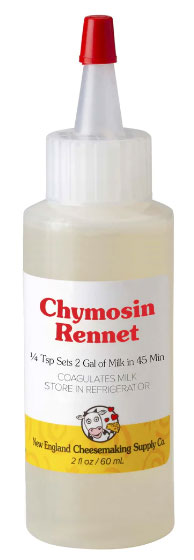
This product is liquid CHY-MAX® from CHR Hansen and is repackaged for the home scale. This is pure chymosin, which is the main enzyme found in animal rennet that coagulates milk. According to cheesemaking.com, this rennet is produced by “submerged fermentation on a vegetable substrate.” It’s a complicated process, but essentially means that it’s created in a lab, is NON-GMO, gluten free, and vegetarian.
Cheese types: hard, semi-hard, soft, mold-ripened, low-fat and ingredient cheeses
Ingredients: water, sodium chloride, chymosin
Strength: double-strength
Item Size: 2 oz to 1 gallon
Setting Quantity: 1/4 teaspoon will set 2 gallons of milk in approximately 45 minutes
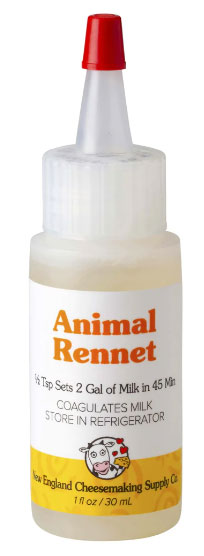
According to cheesemaking.com, this is the “highest quality form of rennet available on the U.S. market today.” Not too shabby! It’s NON-GMO and easy to use. Most of our recipes at The Art of Cheese are written for this type of rennet.
Cheese types: hard, semi-hard, soft, mold-ripened, low-fat and ingredient cheeses
Ingredients: veal rennet, sodium chloride, sodium benzoate 1%, water
Strength: single-strength
Item Size: 1 oz to 1 gallon
Setting Quantity: 1/2 tsp will set 2 gal of milk in approximately 45 minutes
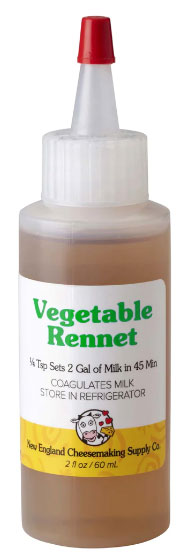
This organic liquid microbial “vegetable” rennet is derived from a fungus. All ingredients conform to organic standards, are gluten free and NON-GMO.
Cheese types: hard, semi-hard, soft, mold-ripened, low-fat and ingredient cheeses
Ingredients: water, sodium chloride, Rhizomucor miehei
Strength: double-strength
Item Size: 1 oz to 1 gallon
Setting Quantity: 1/4 teaspoon will set 2 gallons of milk in approximately 45 minutes
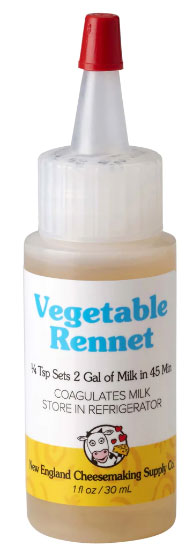
This is a liquid vegetable rennet that contains no animal products, is NON-GMO and gluten free.
Cheese types: hard, semi-hard, soft, mold-ripened, low-fat and ingredient cheeses
Ingredients: water, sodium chloride, Mucorpepsin
Strength: double-strength
Item Size: 1 oz to 1 gallon
Setting Quantity: 1/4 teaspoon will set 2 gallons of milk in approximately 45 minutes
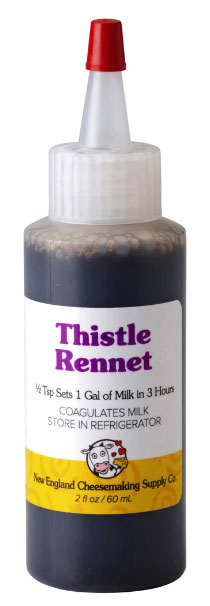
Now things get interesting! This liquid thistle rennet, also known as cardoon, is NON-GMO and 100% flower extract rennet. Although thistle rennet is most popular in Spain and Portugal, this one is USA-made from thistle (Cynara cardunculus).
Cheese types: Traditionally used for small scale, artisanal cheese with sheep and goat milk including Ibores. It can also be used with cow’s milk.
Ingredients: water, enzymes, sodium chloride, sodium benzoate
Strength: This rennet is a bit different from your typical liquid animal or vegetarian rennet and usually doesn’t work as a direct substitute. See directions below.
Item Size: 2 oz and 1 kg (Kosher upon request)
Setting Quantity: 1/2 – 1 teaspoon will set 1 gallon of milk in approximately 2 1/2 – 3 hours
Directions: “Add 1/2 – 1 tsp to 1 gallon of milk, at the same time as the culture. Stir thoroughly (this liquid rennet needs to be stirred longer than other varieties). Allow to set for 2 1/2 – 3 hours, to achieve a firm curd. If the final cheese has a bitter taste, use slightly less rennet on the next batch.”
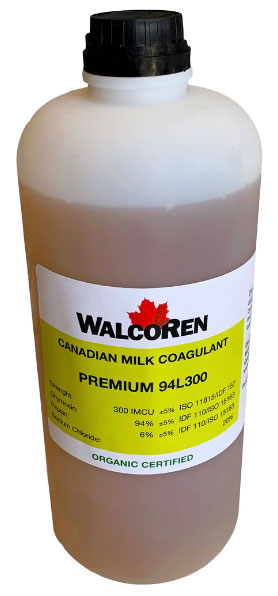
This organic calf rennet is NON-GMO, pure natural calf rennet. Its production uses a traditional extraction process which was developed in Tirol. According to cheesemaking.com, “this process guarantees the highest production purity and the most consistent production quality.“
Cheese types: hard, semi-hard, soft, mold-ripened, low-fat and ingredient cheeses
Ingredients: calf rennet, salt
Strength: single-strength
Item Size: 250 grams (approximately 8 oz) or 1 kilogram (approximately 30 oz) (Halal certificate available upon request)
Setting Quantity: 1/4 tsp will set 1 gallon of milk
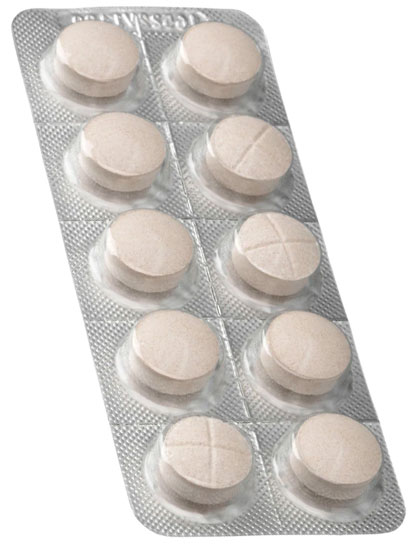
This rennet contains no animal products, is gluten free and NON-GMO. Each tablet is scored into 4 segments, making it easy to break into smaller amounts.
Cheese types: hard, semi-hard, soft, mold-ripened, low-fat and ingredient cheeses
Ingredients: microbial coagulant (mucor pussillus and/or mucor miehei), magnesium stearate, microcrystaline cellulose
Setting Quantity: 1/2 tablet will set 2 gallons of milk in approximately 45 minutes
Directions: “Store in the freezer for up to 3 years. Crush desired portion of rennet tablet. After crushing, mix rennet, till dissolved, in about 1/4 cup cool, non-chlorinated water. Immediately add diluted rennet to milk, gently stir for 1 minute, to evenly distribute. Once mixed, the rennet solution cannot be stored for later use.”
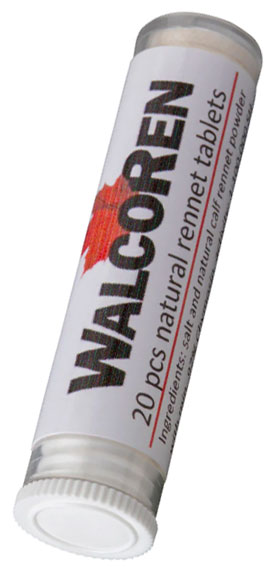
These organic animal rennet tablets are NON-GMO. Each tube contains 80 tablets for 1 gallon of milk each, making it easy for home cheese making.
Cheese types: hard, semi-hard, soft, mold-ripened, low-fat and ingredient cheeses
Ingredients: salt, natural calf rennet powder with min. 97% chymosin, activity: 925 IMU
Setting Quantity: 1 tablet will set 1 gallon of milk in approximately 55 minutes
Directions: “Store in the refrigerator. Crush desired portion of rennet tablet. After crushing, mix rennet, till dissolved, in about 1/4 cup cool, non-chlorinated water. Immediately add diluted rennet to milk, gently stir for 1 minute, to evenly distribute. Once mixed, the rennet solution cannot be stored for later use.”
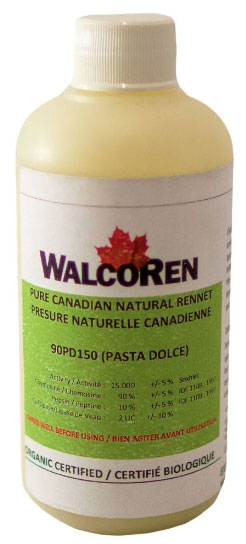
This organic calf rennet paste (Dolce) is a NON-GMO, pure natural calf rennet paste. Its production is based on traditional rennet methods.
Cheese types: hard, semi-hard, soft, mold-ripened, low-fat and ingredient cheeses
Ingredients: calf rennet, salt, < 5% sodium benzoate
Item Size: 250 grams
Setting Quantity: Approximately 1/4 tsp will set 1 gallon of milk
Directions: “Store in the refrigerator. Shake well before use. Mix required amount of rennet in about 1/4 cup cool, non-chlorinated water. Immediately add diluted rennet to milk, gently stir for 1 minute, to evenly distribute.”
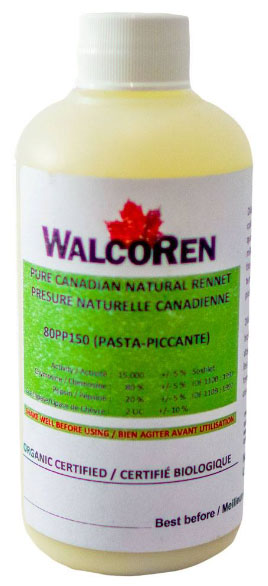
This organic natural kid rennet paste (Piccante) is NON-GMO. Its production is based on traditional rennet methods.
Cheese types: can be used for a variety of cheeses but is particularly helpful for aged cheeses that require goat lipase for desired flavor development. This also works well for mixed-milk or cow-milk cheeses.
Ingredients: goat rennet, salt, < 5% sodium benzoate
Item Size: 250 grams
Setting Quantity: Approximately 1/4 tsp will set 1 gallon of milk
Directions: “Store in the refrigerator. Shake well before use. Mix required amount of rennet in about 1/4 cup cool, non-chlorinated water. Immediately add diluted rennet to milk, gently stir for 1 minute, to evenly distribute.”
WalcoRen Organic Lamb Rennet Paste
This organic pure lamb rennet paste (SemiPiccante) is non-GMO. Its production is based on traditional rennet methods.
Cheese types: Can be used for a variety of cheeses but is particularly helpful for aged cheeses that require sheep lipase for flavor desired flavor development. This also works well for mixed-milk or cow-milk cheeses.
Ingredients: lamb rennet, salt, < 5% sodium benzoate
Item Size: 250 grams
Setting Quantity: Approximately 1/4 tsp will set 1 gallon of milk
Directions: “Store in the refrigerator. Shake well before use. Mix required amount of rennet in about 1/4 cup cool, non-chlorinated water. Immediately add diluted rennet to milk, gently stir for 1 minute, to evenly distribute.”
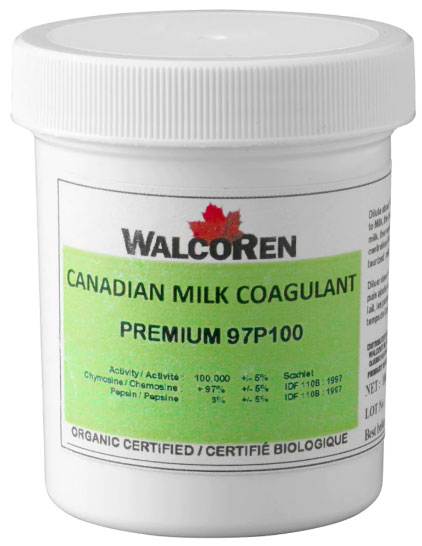
This organic rennet is NON-GMO and comes in powder form. It tends to have a longer shelf-life than the liquid version and fewer ingredients.
Cheese types: hard, semi-hard, soft, mold-ripened, low-fat and ingredient cheeses
Ingredients: enzyme, salt
Item Size: 100 grams or 500 grams
Setting Quantity: Approximately 1/16 tsp will set 2 gallons of milk
Directions: “Store in the freezer. Mix required amount of rennet in about 1/4 cup cool, non-chlorinated water. Let rennet solution sit for 30 minutes for complete dissolution. Add diluted rennet to milk, gently stir for 1 minute, to evenly distribute.”
Note: all the available rennet options on cheesemaking.com are free from peanuts, tree nuts, sesame, milk, eggs, fish, crustaceans, shellfish, soy, wheat, triticale, mustard, sulfites
you might also like:
Disclaimer: all images are owned and copyright by their respective owners and website (blog.cheesemaking.com) and “https://cheese.deals/blogs” is for news, information, product news and reviews.

